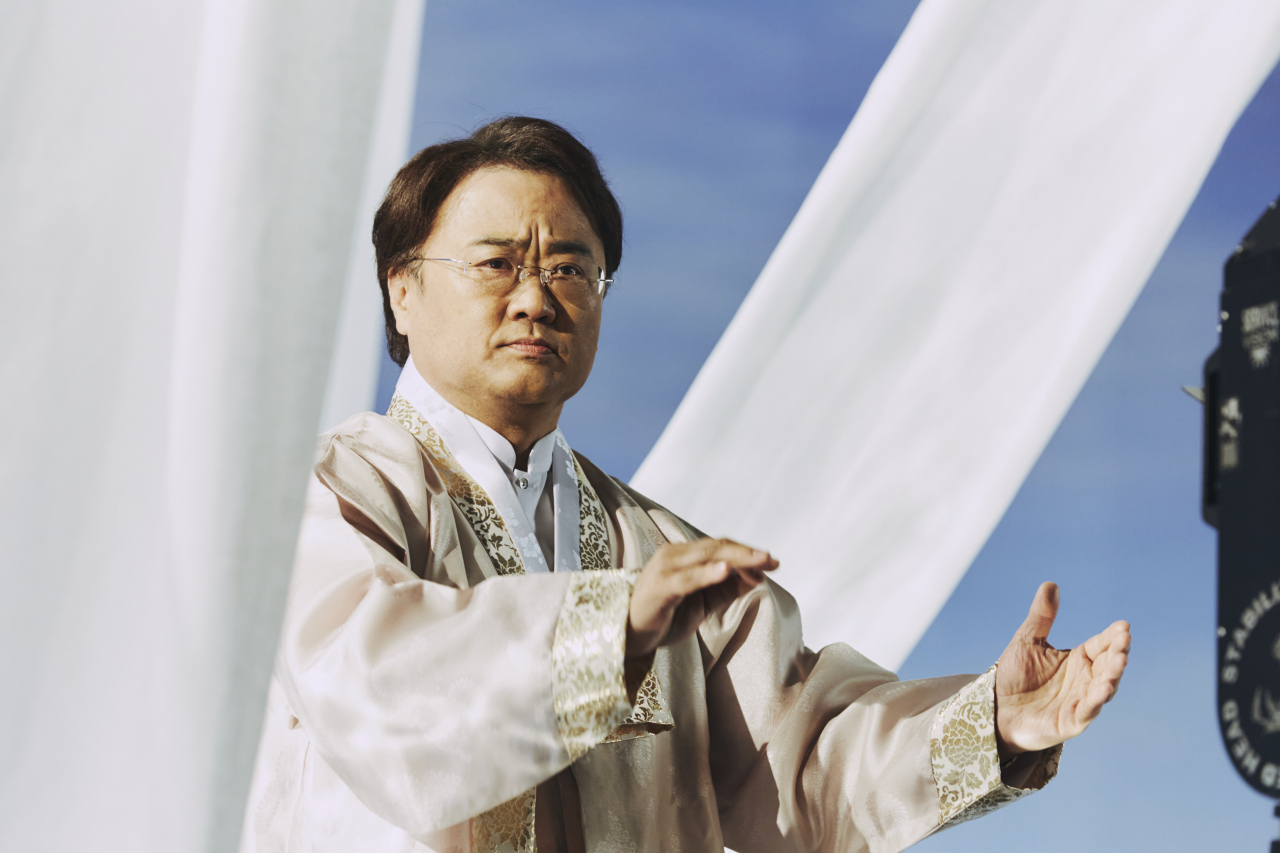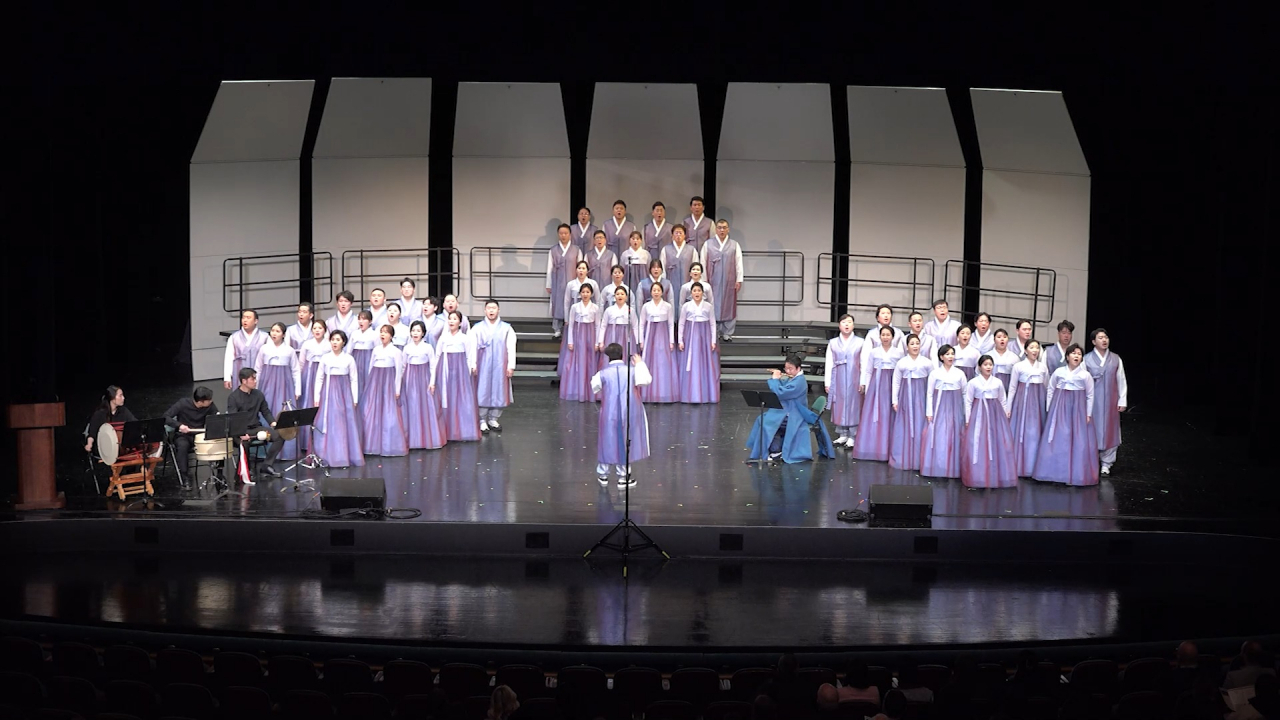[Herald Interview] National Chorus of Korea's artistic director hopes to revive harmony
By Park Ga-youngPublished : May 31, 2023 - 17:10

During the 1970s and 1980s, South Korea experienced a flourishing chorus culture with numerous small and large chorus groups. Prior to the start of the 9 o'clock TV news program, art songs would be broadcast, and amateur competitions and festivals were abundant. It was around that time the National Chorus of Korea was founded in 1973, followed by chorus groups established by regional governments. This period marked a golden era for chorus culture in Korea, according to Yoon Eui-joong, the artistic director and conductor of the 50-year-old organization.
However, as the educational landscape in South Korea began to shift with the college entrance system becoming a top priority, academic achievement came to overshadow all other extracurricular activities, including chorus groups. This shift in priorities resulted in a decline in the prominence and popularity of chorus culture in South Korea.
Despite the shift in priorities and the decline of chorus culture in South Korea, the National Chorus of Korea has played a crucial role in introducing choral works to Korean audiences by premiering choral works by notable composers such as George Frideric Handel, Johann Sebastian Bach, Joseph Haydn, Felix Mendelssohn, Johannes Brahms and many more.
In recent years, the NCK has dedicated itself to the development of choral music in Korea and aiming to introduce it to global audiences.
Yoon, the artistic director and conductor of the NCK since 2017, expressed his desire to revive the appeal of the chorus -- not only among Korean audiences but also worldwide --in an interview with The Korea Herald.
The NCK has been actively working to introduce original cantatas every year with the aim of creating representative repertoires. Composers-in-residence like Oh Byeong-hee and Woo Hyo-won have been leading this endeavor. Their original choral works, such as Woo's "My Country" and Oh's "Hunminjeongeum," have become highly sought-after pieces.
Yoon emphasized that Korea has abundant resources in terms of composers, singers, and art songs, and making them more accessible to audiences is part of his responsibility. He believes that like French chanson and German lied, Korean art songs have the potential to be beloved by audiences beyond Korea's borders.
As part of their efforts, the NCK released their first album, titled "Voices of Solace," in June 2022. The album features 11 tracks, including popular songs like "Arirang," "Living in Cheongsan," "Island Baby," "Starvation," "Saeya, Saeya (Birds, Birds)" and "Eo-gi-young-cha."

When Yoon likens chorus to the air that he breathes, it’s not an exaggeration. Practically all of Yoon’s family are musicians.
Both his father Yoon Hak-won and father-in-law Choi Hoon-cha are famous chorus conductors. His wife is an organist, while his son studies conducting and his daughter is a vocal studies major. His sister majored in piano. Yoon originally majored in violin, but decided to learn choral conducting at the University of Cincinnati.
“I see the world through chorus, express my emotion through chorus and meet friends and coworkers through chorus. So choral singing is an essential and indispensable presence to me, just like air,” Yoon said.
He hopes that younger generations, who have little exposure to Korean art songs and chorus culture, discover their charms.
“Some 90 percent of pop music deals with love between women and men, but life is not constrained to romantic love,” he said.
The act of harmonizing and reaching a consensus is not commonly seen by the public. However, through choral singing, even individuals from different perspectives and backgrounds can collaborate, he explained.
“By singing, you can learn how to cooperate with other people. Imagine people from South and North Korea, and lawmakers from different parties singing together."
“Singing in a chorus is an activity that builds good relationships. You learn how to cooperate and sacrifice." he added.
“A national chorus is rare. I appreciate that the government at the central and local levels allocate budgets to support chorus organizations. I feel a great sense of responsibility,” Yoon noted.
On June 1, the NCK will present popular cantatas at Lotte Concert Hall to commemorate its 50th anniversary.











![[Today’s K-pop] BTS pop-up event to come to Seoul](http://res.heraldm.com/phpwas/restmb_idxmake.php?idx=644&simg=/content/image/2024/04/17/20240417050734_0.jpg&u=)





![[KH Explains] Hyundai's full hybrid edge to pay off amid slow transition to pure EVs](http://res.heraldm.com/phpwas/restmb_idxmake.php?idx=652&simg=/content/image/2024/04/18/20240418050645_0.jpg&u=20240418181020)

![[Today’s K-pop] Zico drops snippet of collaboration with Jennie](http://res.heraldm.com/phpwas/restmb_idxmake.php?idx=642&simg=/content/image/2024/04/18/20240418050702_0.jpg&u=)